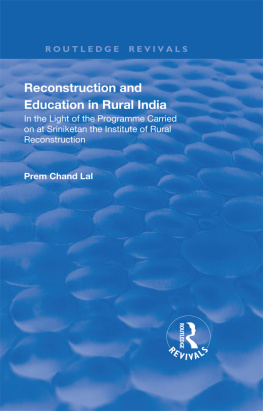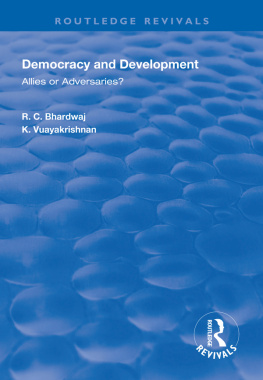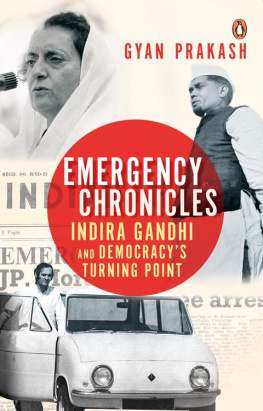First published in 1926 by
Routledge, Trench, Trbner & Co Ltd
Reprinted in 2000, 2002 by
Routledge
2 Park Square, Milton Park, Abingdon, Oxon, OX14 4RN
Transferred to Digital Printing 2007
Routledge is an imprint of the Taylor & Francis Group
1926 Gyan Chand
All rights reserved. No part of this book may be reprinted or reproduced or utilized in any form or by any electronic, mechanical, or other means, now known or hereafter invented, including photocopying and recording, or in any information storage or retrieval system, without permission in writing from the publishers.
The publishers have made every effort to contact authors/copyright holders of the works reprinted in Trbners Oriental Series. This has not been possible in every case, however, and we would welcome correspondence from those individuals/companies we have been unable to trace.
These reprints are taken from original copies of each book. In many cases the condition of these originals is not perfect. The publisher has gone to great lengths to ensure the quality of these reprints, but wishes to point out that certain characteristics of the original copies will, of necessity, be apparent in reprints thereof.
British Library Cataloguing in Publication Data
A CIP catalogue record for this book is available from the British Library
The Financial System of India
ISBN 0-415-24490-0
India: History, Economy and Society: 11 Volumes
ISBN 0-415-24288-6
Trbners Oriental Series
ISBN 0-415-23188-4
ISBN 978-1-136-38168-3 (ePub)
THE FINANCIAL SYSTEM
OF INDIA
BY
GYAN CHAND, M.A.
Economics Department, Benares Hindu University
WITH A FOREWORD BY
THE RIGHT HON. EDWARD HILTON YOUNG
P.C., D.S.O., M.P.
LONDON
ROUTLEDGE, TRENCH, TRUBNER & CO., LTD.
BROADWAY HOUSE: 68-74 CARTER LANE, E.C. 1926
TO
PROF. P. K. TELANG, M.A., LL.B.
OF BENARES
FOR ALL THAT THE AUTHOR OWES TO
HIS PRECEPT AND EXAMPLE
THE object of the book is to describe and examine the working of the Indian Financial System. It is a hazardous task, and would, probably, not have been undertaken but for the fact that till the end of 1923 there was no book in the field to which an ordinary reader could have an access to understand the constitution and the principles of the system of financial administration in India. In December, 1923, Mr. P. K. Wattal, M.A., of the Indian Audit and Account Service, brought out his book, The Financial Administration of British India. By that time the present work had already been planned and almost half finished, and it was considered desirable to complete it on the assumption that the difference in treatment would justify its publication. The book is now presented to the public, and it is hoped that it will be found useful by all who take an intelligent interest in matters with which it deals.
It is not necessary to say much about the scope of the book. It deals with things as they are and as they might be. I have taken the liberty to comment on and criticize the working of the present system freely and make constructive suggestions, as far as possible. The merits of the system have always been kept in mind, and emphasized in view of the importance and necessity of conserving the gains of the existing order. The recognition of its merits has made it possible to point out its shortcomings without an uneasy feeling of being prejudiced against it. In India the study of the Financial System has so far been neglected in spite of the great interest that the financial questions have aroused since the beginning of the National Movement. The absence till the Reforms of popular control of finances, which alone could have given significance to the desire and effort to understand it, is one of the reasons which account for this general indifference. The reason does not exist now. The introduction of partial popular control of finances and growing determination of the nation to make it more real and extensive are very good reasons for studying thoroughly the principles and practical working of the present system. It is assumed that the public is already alive to the need of acquiring this knowledge, and the book will, therefore, satisfy a real demand. The national problem in India is many-sided and complex, and it is possible that this book may, in some measure, be helpful in understanding it more fully.
The book has been written for the general public, but it is expected that it will specially appeal to the scientific students of the subject. Finance is, to use Mr. Mellons phrase, the peoples business; but it is also an intricate business and the people need more light, which must come from the Universitiesour centres of learning. The Indian Universities have till recently neglected the subject of finance, and though problems of public revenue and expenditure have of late received greater attention, those of financial administration have not yet come to their own. The Hindu University has recently recognised the importance of the subject and instituted courses of studies for B.A.(Honours) and M.A. classes, but the other Universities have not considered it worth while to give it a place in their curricula. It is pre-eminently desirable that this indifference should pass away, and the study of the subject be cultivated in a scientific spirit. The book may perhaps be of some use in stimulating a scientific interest in the study of the subject and lead others to investigate its different aspects more thoroughly.
For the foreign student the study of the Indian Financial System has an interest of its own. India is not yet a democracy, but her Financial System has certain features which make it worthy of consideration. In its working may be traced the combination of different and in some respects divergent tendencies, and the fact that it is in a state of flux gives to it an interest which it otherwise would not possess. The book does not aim at giving a comparative view of the subject, but it will be possible for the students of financial administration in other countries to study the general principles in the working of the Indian System. In the arguments of the book special pains have been taken to distinguish the wood from the trees, and details of the System have been explained with reference to general principles of wide applicability. The book will, it is hoped, on that account commend itself to the attention of the academic students all over the world.
















